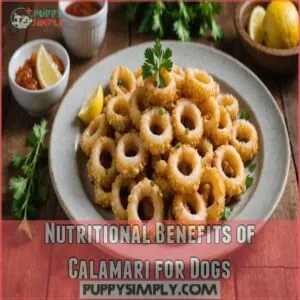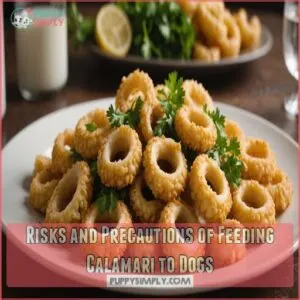This site is supported by our readers. We may earn a commission, at no cost to you, if you purchase through links.
 Sure, but it’s like giving a child the reins of an ice cream truck! Calamari itself isn’t toxic to dogs, but how you cook it matters.
Sure, but it’s like giving a child the reins of an ice cream truck! Calamari itself isn’t toxic to dogs, but how you cook it matters.
Avoid fried calamari—it’s loaded with fats that can lead to obesity and other health issues.
Instead, offer your pup plain, cooked squid, similar to when feeding scallops to dogs safely, and watch for any allergic reactions.
Remember, moderation is key! Fido’s diet should be balanced, with treats staying below 10% of their intake.
While calamari isn’t harmful, other seafood like salmon or sardines might be better choices.
Curious about the best seafood options for dogs? Stay tuned!
Table Of Contents
- Key Takeaways
- What is Calamari?
- Nutritional Benefits of Calamari for Dogs
- Risks and Precautions of Feeding Calamari to Dogs
- Safe Calamari Preparation and Serving for Dogs
- Alternative Seafood Options for Dogs
- Calamari Allergies and Sensitivities in Dogs
- The 90/10 Rule of Dog Snacking and Calamari
- Calamari and Dog Health Considerations
- Frequently Asked Questions (FAQs)
- Can I feed my dog calamari?
- Are dogs allowed to eat cooked squid?
- Can dogs and cats eat calamari?
- What seafood should dogs not eat?
- How often can dogs eat calamari?
- Are there low-mercury squid options available?
- Can puppies safely consume calamari?
- What are calamari portion sizes for dogs?
- Does calamari affect dogs dental health?
- Conclusion
Key Takeaways
- Don’t feed your dog fried or seasoned calamari; steam or grill it plain to avoid health risks.
- Limit calamari to 10% of your dog’s daily intake, ensuring it doesn’t replace their balanced diet.
- Watch for allergic reactions like itching or vomiting after introducing calamari.
- Choose other seafood like salmon or sardines for better nutrition and safer options.
What is Calamari?
You’ve probably seen calamari on restaurant menus, but what exactly is this seafood dish?
Calamari is simply the Italian word for squid, often referring to battered and fried squid rings that are popular as an appetizer or snack.
The Basics of Calamari
Ever wondered what’s on your plate when you order calamari? It’s not some fancy sea creature—it’s good old squid! Calamari is the Italian word for squid, and it’s become a popular dish worldwide.
These cephalopods are known for their tender texture and mild, slightly sweet flavor.
With a body that looks like a tube and tentacles that might remind you of an octopus, calamari offers a unique seafood experience.
Popular Preparations
Calamari comes in a variety of mouthwatering preparations.
You’ll often find it grilled, fried, steamed, breaded, or sautéed.
The classic fried squid rings are a crowd-pleaser, but they’re not ideal for your furry friend.
When considering safe foods for dogs, stick to plain, grilled calamari without seasonings.
Remember, moderation is key for your pup’s snack ideas.
Always prioritize dog food safety and consult your vet before introducing new treats.
Calamari Vs. Squid: is There a Difference?
You might be wondering if calamari and squid are the same thing.
Well, they’re like twins with different haircuts!
Calamari is actually the Italian word for squid.
Here’s the scoop:
- Calamari usually refers to the dish, while squid is the creature
- Both come from the same cephalopod family
- Texture can vary: calamari is often more tender
- Cooking methods affect taste: fried calamari vs. grilled squid
So, when you’re considering calamari for your pup, remember it’s just dressed-up squid!
Nutritional Benefits of Calamari for Dogs
You might be surprised to learn that calamari can offer some nutritional perks for your furry friend.
From protein to essential fatty acids, this seafood treat packs a punch of nutrients that could benefit your dog’s health, much like crab meat in crab cakes, which is a lean protein rich in omega-3s, vitamin B12, and selenium like safe ingredients in crab cakes. This seafood treat packs a punch of nutrients that could benefit your dog’s health when served in moderation.
Protein Powerhouse
Packed with protein, calamari can be a tasty treat for your furry friend.
It’s a lean source that’ll help keep your pup’s muscles strong and tail wagging.
Active dogs and seniors alike can benefit from this seafood snack.
Just remember, moderation is key!
While calamari’s a protein powerhouse, it shouldn’t replace your dog’s regular chow.
Think of it as an occasional, protein-packed bonus in their balanced diet.
Fatty Acids and Omega-3s
A sea of benefits awaits your furry friend in calamari’s omega-3 fatty acids.
These underwater powerhouses can work wonders for your pup’s health.
Here’s how omega-3s can keep your dog’s tail wagging:
- Boost coat shine and skin health
- Support joint flexibility and comfort
- Enhance brain function and cognitive abilities
While calamari’s a tasty source, don’t forget other fish in the sea.
Sardines and salmon are also excellent omega-3 providers.
Just remember, moderation’s key in this nutritional treasure hunt!
Essential Vitamins and Minerals
Think of calamari as a vitamin and mineral treasure chest for your furry friend.
It’s chock-full of iron, which helps keep your pup’s energy levels up, and zinc for a healthy immune system.
Calamari also dishes out B vitamins for metabolism and phosphorus for strong bones, and just like nutrient-rich puppy food for digestive health, supports nutrient absorption for good growth and development.
But don’t swap out Fido’s kibble just yet – while calamari packs a nutritional punch, it’s best as an occasional treat in your dog’s balanced diet.
Considerations for Dog Owners
Before tossing your pup a calamari ring, pause for a sec.
While it’s packed with nutrients, calamari comes with a catch.
Moderation is key – think of it as a special treat, not a daily snack.
Keep an eye out for allergies, and always prep it safely.
Grilled or boiled is best, but skip the deep-fried stuff.
Remember, there are plenty of fish in the sea – consider safer alternatives if you’re unsure.
Risks and Precautions of Feeding Calamari to Dogs
While calamari can be a tasty treat, it’s not all smooth sailing when feeding it to your furry friend.
You’ll want to watch out for high mercury levels, harmful seasonings, and the risk of allergic reactions that could turn your pup’s seafood adventure into a not-so-fun trip to the vet.
High Levels of Mercury
While calamari offers nutritional benefits, it’s not all smooth sailing.
Mercury levels in seafood can be a real party pooper for your pup’s health.
This sneaky toxin can accumulate in your dog’s system, leading to some serious issues.
Let’s break down the Mercury Mayhem:
- Nervous system troubles: Think wobbly walks and confusion
- Heart health hiccups: Irregular heartbeats, anyone?
- Tummy turmoil: Upset stomachs and diarrhea, oh my!
- Kidney chaos: Your pup’s built-in filters might struggle
Butter, Garlic, Onion, and Other Seasonings
Seasoning dangers lurk in homemade calamari for your furry friend.
Garlic and onions are toxic to dogs, causing anemia and digestive issues.
Butter can lead to pancreatitis, while salt might cause dehydration.
If you’re looking for a convenient alternative, consider purchasing dog calamari treats online from stores that sell safe products, like calamari dog chews.
Stick to plain, unseasoned calamari as a rare treat.
If you’re set on adding flavor, try dog-safe herbs like parsley or basil.
Remember, in terms of your pup’s health, bland is beautiful!
Saturated Fat
Fried calamari might be a treat for you, but it’s a ticking time bomb for your pup’s health.
The saturated fat in fried squid can lead to canine pancreatitis faster than you can say "doggy diet disaster."
Opt for fat-free calamari options to keep your furry friend’s tail wagging.
Remember, high-fat treats are a no-go for dogs.
Stick to lean, grilled calamari if you must share, but always in moderation.
Your dog’s waistline will thank you!
Risk of Allergic Reactions
Just like humans, dogs can have allergies too.
Calamari might trigger a seafood allergy in your pup.
If your dog does have an allergy, hypoallergenic dog food brands can be a great alternative to manage their symptoms.
Keep an eye out for signs like itching, swelling, or tummy troubles after they’ve had a taste.
If Fido starts scratching like they’re auditioning for a flea circus, it’s time to call the vet.
When introducing new foods to your dog’s diet, it’s crucial to consider their potential allergies and sensitivities, such as lactose intolerance, as discussed in the ultimate guide to what huskies can and cant eat. Remember, it’s better to be safe than sorry regarding your furry friend’s health!
Safe Calamari Preparation and Serving for Dogs
When you’re serving calamari to your dog, the key is keeping it simple and safe.
Stick to plain, grilled, or boiled calamari, and skip any spices or sauces that might upset your pup’s tummy.
The Best Ways to Serve
With a little preparation, you can safely share calamari with your furry friend!
For the best results, opt for Grilled or Boiled Calamari.
Keep it Plain, avoiding extra seasonings.
Remember Portion Control; start with a tiny amount.
After introducing calamari, Monitor for Adverse Reactions.
A small, cooked piece is a good starting point.
Enjoy this tasty treat responsibly!
What to Avoid
As you whip up a squid snack for Fido, here’s what to avoid.
1. Kick fried calamari to the curb—its fat brings pancreatitis risks.
2. Raw calamari? Nope! Think bacteria.
3. Keep garlic, onions, and butter off the guest list; they’re toxic.
When preparing seafood for your pup, be aware of the risks associated with common seafood allergens like shell fragments and choking hazards.
4. Avoid hidden toxins in calamari, ensuring your pup enjoys safe bites without worry.
Monitoring Your Dog’s Reaction
After treating your dog to calamari, it’s wise to keep a vigilant eye on their health.
Look for gastrointestinal distress like vomiting or diarrhea, skin changes, or behavioral changes.
Notice any shifts in energy levels, too.
These hints could signal an adverse reaction.
Remember the 90/10 rule of dog snacking to make sure calamari remains a safe, tasty treat in their diet.
Portion Size Matters
Once you’ve kept an eye on your dog’s reaction to calamari, it’s time to think about portion size.
Remember, portion size matters.
A small piece is enough.
If you’re concerned about finding the right dog calamari safe products, you can explore online stores that offer a variety of calamari-based dog treats dog calamari safe.
Checking up on calorie content, snack frequency, and your dog’s breed can help tailor serving sizes.
Opt for healthy treats for dogs and explore treat alternatives that won’t disrupt their dog diet or nutrition advice.
Alternative Seafood Options for Dogs
If you’re thinking about offering your dog alternatives to calamari, consider safe seafood options like salmon, tuna, and cod that pack a healthy punch.
These fish, like duck which is a lean protein source rich in omega-3 fatty acids, provide essential nutrients and are generally easier to digest, giving your pup a tasty treat without the risks.
Salmon as a Healthy Option
Salmon’s a great option for your pup! It’s packed with Omega-3s and supports their skin and coat. Here are four things to keep in mind:
- Salmon nutrition boasts key nutrients.
- Canned vs. fresh – choose wisely to guarantee quality.
- Salmon recipes can be a delicious treat.
- Be aware of Salmon allergies in dogs.
Tuna and Cod as Protein Sources
While salmon’s a top choice, tuna and cod also pack a protein punch for your pup.
Great alternatives, these fish offer Omega-3 benefits without breaking the bank.
Canned vs. fresh—always go for the latter to avoid preservatives.
Be mindful of fish allergies; consult a dog vet online if unsure.
Treat your furry friend wisely with these delightful fish options!
Sardines for Omega-3 Fatty Acids
Speaking of healthy seafood, sardines are another great option! They’re packed with omega-3s, boosting your pup’s coat and brainpower. But remember, moderation is key!
Here’s what you need to know:
- Choose canned sardines packed in water, not oil.
- Remove bones before serving.
- Fresh sardines are fine too, but make sure they’re properly cooked.
- Always supervise your dog while they eat.
Calamari Allergies and Sensitivities in Dogs
When you treat your pup to calamari, it’s important to watch out for any allergic reactions, as some dogs can be sensitive to squid.
Keep an eye out for symptoms like itching, vomiting, or swelling, and if you notice anything unusual, it’s time to call your vet.
Squid Allergies in Dogs
Considering calamari for your dog, keep an eye out for squid allergies.
Dogs can be sensitive to certain seafood, much like some folks who break out in a rash after munching on shrimp.
Squid allergy symptoms are rare but can happen.
Avoiding calamari might be the safest route if your pup’s had previous seafood faux pas.
Always consult with your vet!
Identifying Signs of Allergic Reactions
You’ve learned about squid allergies in dogs.
Now, watch for allergic signs if your pup tries calamari.
Look out for:
- Skin rash
- Vomiting
- Diarrhea
- Paw licking
- Itchy ears
These symptoms can hint at calamari allergies and sensitivities.
Stay alert and chat with a vet if your dog shows these symptoms.
Safe eating keeps tails wagging!
Cross-Reactivity With Other Seafood
Sometimes, dogs allergic to squid might react to other seafood due to shared proteins, just like those found in shellfish that can cause allergic reactions in dogs. This cross-reactivity means you’ve got to watch out for allergic triggers, especially if your dog has had issues with fish to avoid feeding dogs.
To keep your dog safe:
- Shellfish allergies can overlap, causing similar symptoms.
- Shared proteins may spark responses.
- Symptom overlap complicates diagnosis.
- Avoid seafood if needed for safety.
- Alternatives to calamari exist that are just as tasty!
The 90/10 Rule of Dog Snacking and Calamari
When treating your dog with calamari, the 90/10 rule is your best friend, allowing you to satisfy their taste buds without going overboard.
Remember, only 10% of your dog’s daily intake should come from treats, ensuring they get the right balance from their regular food.
Importance of Moderation
Allergies aside, let’s chat about the 90/10 rule—a lifesaver for guilt-free dog snacking.
Imagine calamari as a tiny piece of your pup’s calorie intake pie. Snack balance means it only fills 10% of their daily allowance.
This rule helps dodge obesity and weight gain, plus avoids risky games with sodium toxicity or dehydration.
Keep portion control tight to sidestep pancreatitis from high-fat calamari.
Stay savvy with safe calamari serving options!
Balancing Calamari With Regular Dog Food
So, you’ve mastered moderation – great job!
Now, let’s talk about blending calamari treats into your dog’s regular diet.
Remember the 90/10 rule: 90% high-quality dog food (kibble or wet), 10% yummy snacks like calamari.
This guarantees balanced nutrition.
Think of it as a delicious, tiny addition, not a meal replacement.
Always prioritize your dog’s nutritional needs and monitor their reactions.
Too much calamari can lead to tummy troubles, so portion control is key!
Safe calamari serving options are plain, grilled, or boiled calamari.
Calamari and Dog Health Considerations
Feeding your dog calamari might sound like a tasty idea, but it’s important to think about potential health risks such as pancreatitis from high-fat content, obesity, and even sodium toxicity.
Before sharing this seafood treat, make sure you understand these dangers to keep your pup healthy and happy.
Pancreatitis From High-Fat Calamari
Feeding your dog fried calamari can lead to pancreatitis, a painful condition caused by high-fat diets.
Imagine these pitfalls: 1. Your dog’s compromised digestion. 2. The vet bills piling up. 3. Your pup feeling under the weather. 4. The risk of serious health issues.
Instead, consider alternatives like nutrient-rich dehydrated fish skin, exploring healthy options, offering safe treats and consulting your veterinarian to sidestep these potential health risks.
Obesity and Weight Gain
Giving Fido calamari regularly? That’s a slippery slope.
These calorie-dense snacks can tip the scales, leading to obesity and weight gain.
Check out some dog eat squid products that might be tempting, but remember to prioritize your pup’s health.
Dog food portion control, especially with a limited ingredient grain-free dog foodlike Zignature Whitefish, and regular exercise help keep your pup spry.
Instead of calamari, consider alternatives to calamari for dogs or safe serving options.
Remember, moderation is key to healthy weight management and avoiding nasty side effects like overfeeding risks.
Sodium Toxicity and Dehydration
Watching your dog’s weight is important, but don’t overlook the potential health risks from high sodium levels in calamari.
This salty snack can lead to sodium toxicity and dehydration in your pup.
Make sure your dog stays hydrated by providing plenty of water.
Keeping an eye on salty treats is pet nutrition advice that prevents these sneaky dangers.
Stay smart with hydration tips!
Frequently Asked Questions (FAQs)
Can I feed my dog calamari?
It’s tempting, but hold the calamari!
While it’s packed with protein, mercury and other ingredients can be harmful.
Stick to safer fish options like salmon or cod.
Your pup will thank you!
Are dogs allowed to eat cooked squid?
Think of cooked squid as a mixed bag of treats for dogs.
You can offer it plainly cooked, like grilled or boiled, without spices or sauces.
It’s safe in moderation but watch for allergies or tummy troubles.
Can dogs and cats eat calamari?
Calamari can be risky for dogs and cats due to mercury and potential allergies.
If you serve it, go for plain, grilled, or boiled styles.
Avoid spices and watch for any adverse reactions in your pets.
What seafood should dogs not eat?
Imagine giving your dog shellfish, only to discover it’s a seafood drama waiting to happen! 戀
Avoid giving crab, lobster, shrimp, clams, mussels, and oysters.
They’re common allergens and could trigger serious health issues.
How often can dogs eat calamari?
You can give your dog calamari occasionally, but keep it rare and make sure it’s plain and cooked.
Follow the 90/10 rule: snacks, including calamari, shouldn’t exceed 10% of your dog’s daily diet for balanced nutrition.
Are there low-mercury squid options available?
Squid tends to have lower mercury levels than larger seafood like tuna, making it a relatively safer choice.
Still, it’s important to moderate their intake and make sure any calamari treats are plain and cooked properly.
Can puppies safely consume calamari?
Puppies can taste calamari, but you’ve got to tread carefully!
Plain, grilled, or boiled is best, avoiding spices or fried pieces.
Mercury and allergies are concerns, so watch for reactions and limit the serving to a snack size.
What are calamari portion sizes for dogs?
Keep calamari treats to 10% of your dog’s daily food. That’s a small portion, like a tiny appetizer! Always cook it plain, never fried. Monitor for any tummy troubles.
Does calamari affect dogs dental health?
Ever wonder if calamari’s a dental nightmare for dogs?
While it’s chewy, it doesn’t offer significant benefits or harm to their teeth.
What’s key is ensuring they chew on safe dental treats or toys to maintain health.
Conclusion
Choosing the right diet for your dog can be like picking your way through a maze of options.
While calamari can be a part of that journey, it’s important to serve it in moderation and make sure it’s plain and cooked.
Can dogs eat calamari? Yes, but watch out for potential allergies and avoid harmful toppings.
Consider other seafood like salmon or sardines, which might be better options.
Balance calamari with their regular dog food for a happy, healthy pup.

















